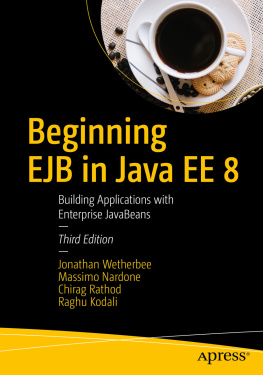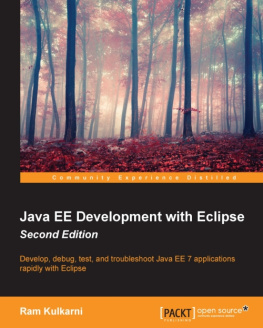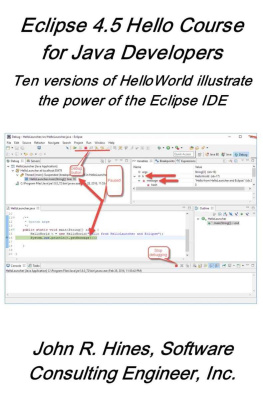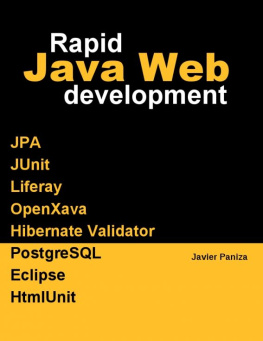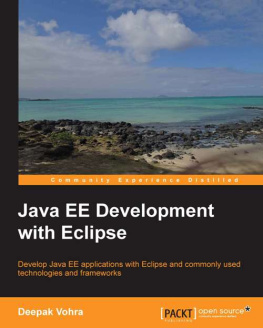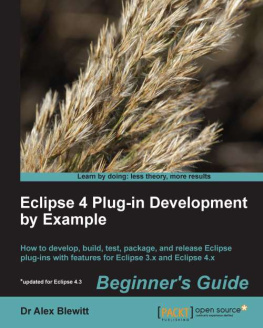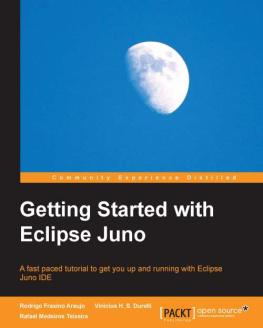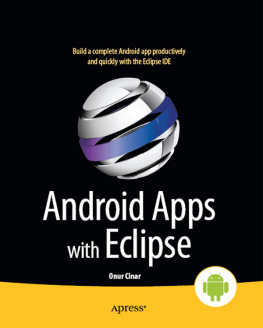Kulkarni - Java EE 8 development with Eclipse
Here you can read online Kulkarni - Java EE 8 development with Eclipse full text of the book (entire story) in english for free. Download pdf and epub, get meaning, cover and reviews about this ebook. year: 2018, publisher: Packt Publishing, genre: Computer. Description of the work, (preface) as well as reviews are available. Best literature library LitArk.com created for fans of good reading and offers a wide selection of genres:
Romance novel
Science fiction
Adventure
Detective
Science
History
Home and family
Prose
Art
Politics
Computer
Non-fiction
Religion
Business
Children
Humor
Choose a favorite category and find really read worthwhile books. Enjoy immersion in the world of imagination, feel the emotions of the characters or learn something new for yourself, make an fascinating discovery.
Java EE 8 development with Eclipse: summary, description and annotation
We offer to read an annotation, description, summary or preface (depends on what the author of the book "Java EE 8 development with Eclipse" wrote himself). If you haven't found the necessary information about the book — write in the comments, we will try to find it.
Kulkarni: author's other books
Who wrote Java EE 8 development with Eclipse? Find out the surname, the name of the author of the book and a list of all author's works by series.
Java EE 8 development with Eclipse — read online for free the complete book (whole text) full work
Below is the text of the book, divided by pages. System saving the place of the last page read, allows you to conveniently read the book "Java EE 8 development with Eclipse" online for free, without having to search again every time where you left off. Put a bookmark, and you can go to the page where you finished reading at any time.
Font size:
Interval:
Bookmark:
Third Edition

Copyright 2018 Packt Publishing
All rights reserved. No part of this book may be reproduced, stored in a retrieval system, or transmitted in any form or by any means, without the prior written permission of the publisher, except in the case of brief quotations embedded in critical articles or reviews.
Every effort has been made in the preparation of this book to ensure the accuracy of the information presented. However, the information contained in this book is sold without warranty, either express or implied. Neither the author, nor Packt Publishing or its dealers and distributors, will be held liable for any damages caused or alleged to have been caused directly or indirectly by this book.
Packt Publishing has endeavored to provide trademark information about all of the companies and products mentioned in this book by the appropriate use of capitals. However, Packt Publishing cannot guarantee the accuracy of this information.
Commissioning Editor: Richa Tripathi
Acquisition Editor: Sandeep Mishra
Content Development Editor: Anugraha Arunagiri
Technical Editor: Madhunikita Sunil Chindarkar
Copy Editor: Safis Editing
Project Coordinator: Ulhas Kambali
Proofreader: Safis Editing
Indexer: Mariammal Chettiyar
Graphics: Tania Dutta
Production Coordinator: Nilesh Mohite
First published: December 2012
Second edition: September 2015
Third edition: June 2018
Production reference: 1260618
Published by Packt Publishing Ltd.
Livery Place
35 Livery Street
Birmingham
B3 2PB, UK.
ISBN 978-1-78883-377-6
www.packtpub.com

Mapt is an online digital library that gives you full access to over 5,000 books and videos, as well as industry leading tools to help you plan your personal development and advance your career. For more information, please visit our website.
Spend less time learning and more time coding with practical eBooks and Videos from over 4,000 industry professionals
Improve your learning with Skill Plans built especially for you
Get a free eBook or video every month
Mapt is fully searchable
Copy and paste, print, and bookmark content
Did you know that Packt offers eBook versions of every book published, with PDF and ePub files available? You can upgrade to the eBook version at www.PacktPub.com and as a print book customer, you are entitled to a discount on the eBook copy. Get in touch with us at service@packtpub.com for more details.
At www.PacktPub.com , you can also read a collection of free technical articles, sign up for a range of free newsletters, and receive exclusive discounts and offers on Packt books and eBooks.
Java Enterprise Edition (JEE, which was earlier called J2EE) has been around for many years now. It is a very robust platform for developing enterprise applications. J2EE was first released in 1999, but underwent major changes with the release of version 5 in 2006. Since version 5, it has been renamed Java Enterprise Edition (JEE). Recent versions of JEE have made developing a multi-tier distributed application a lot easier. J2EE had focused on core services and had left the tasks that made application development easier to external frameworks, for example, MVC and persistent frameworks. But JEE has brought many of these frameworks into the core services. Along with the support for annotations, these services simplify application development to a large extent.
Any runtime technology is not good without good development tools. The Integrated Development Environment (IDE) plays a major part in developing applications faster, and Eclipse provides just that for JEE. Not only do you get good code editing support in Eclipse, but you also get support for build, unit testing, version control, and many other tasks important in different phases of software application development.
In this chapter, we are going to cover the following topics:
- Introduction to different technologies in JEE
- Introduction to the Eclipse development environment
- Installation and configuration of some of the frequently used software in this book, for example, JEE servers, Eclipse IDE, and MySQL Database Server
The goal of this book is to show how you can efficiently develop JEE applications using Eclipse by using many of its features during different phases of the application development. But first, here is a brief introduction to JEE and Eclipse.
JEE is a collection of many of the Java Community Process ( https://www.jcp.org ) programs. Currently, JEE is in Version 8. However, different specifications of JEE are at their own different versions.
JEE specifications can be broadly classified into the following groups:
- Presentation layer
- Business layer
- Enterprise integration layer
Note that JEE specification does not necessarily classify APIs in the preceding broad groups, but such classification could help in better understanding the purpose of the different specifications and APIs in JEE.
Before we see APIs in each of these categories, let's understand a typical JEE web application flow, as shown in the following diagram, and where each of the preceding layers fits in:

Requests start from the clients. A client can be any application requesting services from a remote applicationfor example, it could be the browser or a desktop application. The request is first received by the web server at the destination. Examples of web servers include Apache web server, IIS, and nginx. If it is a request for static content, then it is served by the web server(s). However, a dynamic request typically requires an application server to process. JEE servers are such application servers that handle dynamic requests. Most JEE specification APIs execute in the application server. Examples of JEE application servers are WebSphere, GlassFish, and WildFly.
Most non-trivial JEE applications access external systems, such as a database or Enterprise Integration Server (EIS), for accessing data and process it. A response is returned from the application server to the web server and then to the clients.
Font size:
Interval:
Bookmark:
Similar books «Java EE 8 development with Eclipse»
Look at similar books to Java EE 8 development with Eclipse. We have selected literature similar in name and meaning in the hope of providing readers with more options to find new, interesting, not yet read works.
Discussion, reviews of the book Java EE 8 development with Eclipse and just readers' own opinions. Leave your comments, write what you think about the work, its meaning or the main characters. Specify what exactly you liked and what you didn't like, and why you think so.

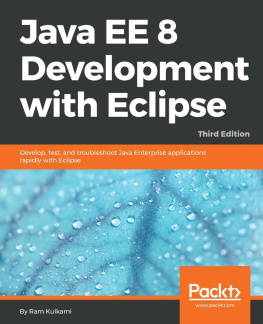


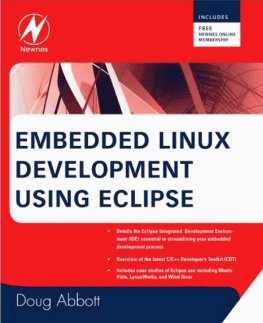
![Ram Kulkarni [Ram Kulkarni] - Java EE 8 Development with Eclipse](/uploads/posts/book/119355/thumbs/ram-kulkarni-ram-kulkarni-java-ee-8-development.jpg)
